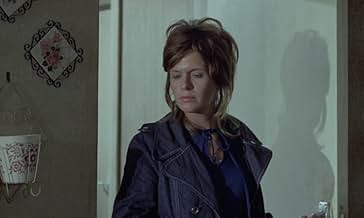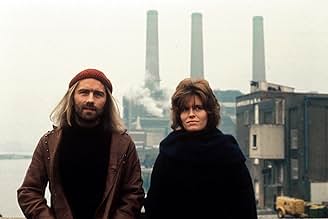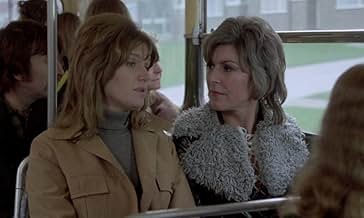Ajouter une intrigue dans votre langueThe story of the relationship between a young single mother and an insecure rock star.The story of the relationship between a young single mother and an insecure rock star.The story of the relationship between a young single mother and an insecure rock star.
Avis à la une
My take on the meaning is to link the title to the melancholy lyric of a song played near the end, "too late to create a world with care", that is, the world is already made, Pandora's box is already opened never to be closed again (recognising the irony of using the term in a review of a feminist or at least superficially feminist film).
The film is often marketed as being about an affair between a housewife and a rock star, however Valerie is more of a working mum, and there are three men in the movie with designs on her. Pop star Mike Preston is outwardly charming and modern, but really this charm is a teflon shield he holds in front of his sophistry, Father Dyson is the local priest who abuses his position of trust to woo Valerie, whilst Mahdav is an Indian immigrant who is university educated and the boss at the switchboard where Valerie works.
Each of these men are deconstructed. Father Dyson and Mike Preston are shown as equivalents (after being set up as opposite poles) in staggering scenes where they feed off of Valerie's grief, Father Dyson for a sermon, and Mike Preston for his sermon equivalent, a pop song. Dyson records his sermon and sits in a church listening to himself on playback, whilst Preston does the same in a recording studio. I think there's an idea here that men are systematisers, expanding their observations into grandiose theories, going from the specific to the general, whereas women understand people on a case-by-case basis. To quote from Dworkin myself: "While gossip among women is universally ridiculed as low and trivial, gossip among men, especially if it is about women, is called theory, or idea, or fact."
Mahdav is a fantasist who interprets a roll in the sack with Valerie as meaning she wants to marry him, he treats her as an object of veneration. He's deeply insensitive, and, like Preston, uses her grief as an opportunity to get closer to her.
Maybe the film is about how confused people become by their own ideologies. I know a young lady who quite confidently told me that a man's weight is not important in terms of attractiveness (the ideology), a couple of weeks later she is telling me of her alarm that her boyfriend is putting on weight, and her action plan to sort that out (the practise). The programmer of the festival, having quoted Dworkin, then complained about the director's lack of chivalry in revealing that he had slept with actress Carole Barker on set (chivalry being an opposite concept based on the concept of the weakness of women). People take themselves very seriously, I for example am sat here re-reading what I have been writing, using the movie as fodder for my sermon.
The movie becomes a Satan's Brew in the end, none of the characters end up being likable, and the film pines for the playground, which is supposedly a pure state, a quite iconic black and white shot of an iron maypole with chains dangling down and coming to a halt symbolises this. I don't think you can call Valerie a heroine either, once you've got past her beauty (something that the men in the film can't do) she is quite cynical, "I don't think people are that lovable really", and simple. Ah what a wicked wicked film.
Apparently the inspiration for the movie is the Beatles' song Eleanor Rigby ("All the lonely people/Where do they all come from?"). One of the lyrics is pretty reflexive for the film, given the director's own name (Mackenzie), "Father McKenzie writing the words of a sermon that no one will hear", especially as this film remains little known and the programmers had to instigate a dig around in the archives at the distributor to even find a copy.
Just to note that it's very well shot at all times, in particular there's a montage of baby items that is quite staggering, won't spoil the context.
A very nitty gritty, grimy drama looking at the worst side of life in the 1970's, a kind of sequel to Poor Cow (1967). It has a higher rating than it deserves, some people look deeply into it to find hidden meanings and metaphors, maybe it makes them feel intelligent ? For me it is a dreary film which just made me feel depressed, maybe it worked in its day (early 1970's) but not anymore, I lived through this period as a boy in Northern England, I had soul destroying problems at the time, it was never this bad or grimy.
Carol White plays a slightly disturbed, miserable cow, who has made all the wrong choices in life, as a single mum, living with her ailing mother (no Father or Father of her baby appear), it s all very despairing, she has a few (more) self-destroying 'relationships' her baby dies, followed by her mother. I am not sympathetic with the character because she herself creates most of the problems she has. Maybe some people suffer from lives like this in real life, but do we really need to see it all compressed into one 1hr 45 min film.
Carol White acts well, but she is the only one, everyone else seems a bit wooden, or maybe dumbfounded by the kind of role they have to play, Roy Harper was poor, he is a Musician not an actor and it shows, his music is not that good either, his biggest claim to fame being a backing voice for Pink Floyd for a very short time, if this was his shot at acting stardom, it failed miserably.
The editing was poor, also continuity, the close-up and ultra close-up shots are a put off with me, I have never liked them, as you miss so much of the real picture, it feels like it was made on the cheap, very cheap, but unlike some films which are made cheap but are successful, this is not one of them.
This film seems to mirror Carol White's real life a little, she had a number of relationships, 3 short marriages, had problems with drugs and alcohol, tried to commit suicide several times and died at 48 with liver disease.
Football back then was very much as shown in this film. It just seems light years away from today Well as to the film it seems like a reprise of Poor Cow,a film which Carol White didn't mention in her autobiography.
She was clearly a very vunerable person who died tragically young. Appearing in films like this was not going to get her career restarted. As for Roy Harper the less said the better.
Le saviez-vous
- AnecdotesAccording to Roy Harper other candidates who auditioned for the lead role were Marc Bolan, Kris Kristofferson and Tony Joe White.
- Citations
Valerie Marshall: You're educated aren't you?
Mahdav: How could you tell?
Valerie Marshall: Oh, I think you can always tell. Our teacher at school said you can always tell an educated man.
Mahdav: How? Do let me know. How does it show?
Valerie Marshall: I dunno... it's ehm... it's a sort of gentle.
Mahdav: A man of the Orient is naturally gentle, yet passionate too. He is both a tranquil stream and a raging torrent.
Valerie Marshall: That's good. I like that.
[pause]
Valerie Marshall: Well, I think I better be going now.
Mahdav: Valerie, we have so much in common, you and I. We're both in need.
Valerie Marshall: In need?
Mahdav: May I tell you that... I find you beautiful?
Valerie Marshall: Not really.
Mahdav: Then let my eyes speak for me. Aren't they eloquent? Look into my eyes. Go on - look. What do you see?
Valerie Marshall: Well, your pupils... they're eh, a bit big.
Mahdav: They are dark pools. They reflect your beauty.
Valerie Marshall: [she laughs]
- Bandes originalesBank Of The Dead (Valerie's Song)
Written by Roy Harper
Produced by Peter Jenner
Performed by Roy Harper
Meilleurs choix
Détails
Contribuer à cette page































